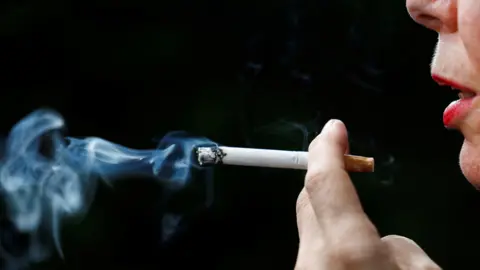Lung cancer is Channel Islands' deadliest cancer
 Reuters
ReutersMore people have died of lung cancer in the Channel Islands than any other type of cancer, according to a new NHS report.
The National Disease Registration Service (NDRS), part of NHS England, found lung, upper gastrointestinal and colorectal cancer killed the most people on the islands up to 2020.
The report, published jointly with both islands' public health services, also found that skin cancer remained the most common cancer in the islands, with more people getting it than on the mainland.
Dr Elizabet Gomes Dos Santos, oncology lead at Jersey’s Health and Community Services (HCS), said the report demonstrated the "ongoing commitment to understanding and addressing cancer at all levels".
While lung cancer killed the highest number of people on both islands, prostate cancer had a slightly higher mortality rate in Guernsey when the figures were adjusted to take account of people's ages, and was second to lung cancer in Jersey.
The report said people were more likely to get lung cancer on the islands than in the South West, but the figures were roughly the same as the England average.
Across all cancers Guernsey and Jersey had broadly-similar rates compared to England and the South West, but there were some differences on individual cancers.
Guernsey's head of public health intelligence Jenny Cataroche said the islands could "draw reassurance" from the figures.
As well as skin cancers, head and neck cancers were more common in both islands compared to England, while breast cancer rates were higher in Jersey than England.
Uterus cancer was lower in Guernsey than England and the South West, while leukaemia was lower in Jersey compared to the mainland.
Prevention
Smoking causes more than 85% of lung cancer deaths, according to Cancer Research UK.
Guernsey recently introduced a ban on smoking in cars carrying children, while other options have been floated such as a ban on beach smoking or an increase in the smoking age.
Jersey has had a similar car smoking ban since 2015 and banned branding on cigarettes in 2022.
A spokesperson for Jersey's Public Health said the higher skin cancer rates in the island were mainly down "UV exposure through sunlight or sun beds".
Diane Mathews, from Guernsey's Public Health Services, said: "That's why it is so important for islanders to enjoy the sun safely."
She said it was possible to prevent cancer by covering up, wearing sun cream and avoiding the sun between 11:00 and 15:00 on sunny days.
Ms Mathews said early detection was also vital, adding people should know "what is normal" for their skin and consult a doctor if anything changed.
Screening services
The report is the second in a series of catch-up reports designed to bring the islands' cancer data up to date, with the final one due in late 2025.
It is the first report to have data about which stage each of the four most common cancers is diagnosed at, from stage one (limited spread) to four (very wide spread).
Ms Cataroche said the new data would help health professionals understand how many cancers were being detected early on the islands.
Dr Gomes Dos Santos, who is also chair of Jersey's Cancer Strategy Implementation Committee, said the research would leave the islands "better equipped" to tackle cancer effectively.
She said it was crucial to "minimise risk factors wherever possible" as well as to enhance "screening and early detection capabilities".
Follow BBC Guernsey on X and Facebook. Follow BBC Jersey on X and Facebook. Send your story ideas to [email protected].
